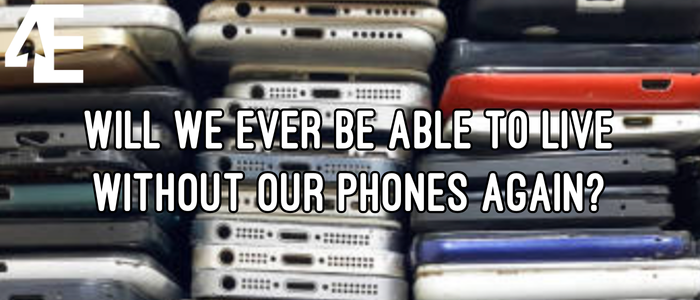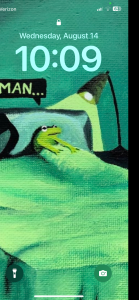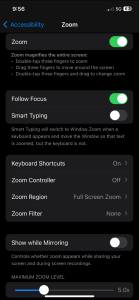You’ve heard it before:
“That phone of yours is causing problems!”
“The youths these days are total screenagers.”
“Get off your phone!”
But really, is “getting off your phone” actually possible?
Over the summer, I had a literally eye-opening experience — a very, very annoying and ridiculous experience — that gave me perspective on the matter.
To set the scene, it was the beginning of August: I trudged through the swampy, sweltering humidity to get to the Foggy Bottom metro station. I boarded the blue line then the red and headed to Union Station for my routine eye exam in Noma.
To skip the boring details of my appointment’s administrative handlings, the optometrist — unbeknownst to me — dilated my pupils. For context, when attending optometrist appointments in the past, I never opted for dilation because I was living in the suburbs and therefore had to drive home. However, in my carless D.C. summer, I was honest with the doctor about my mode of transportation and ended up TRICKED (not really) into getting my pupils dilated.
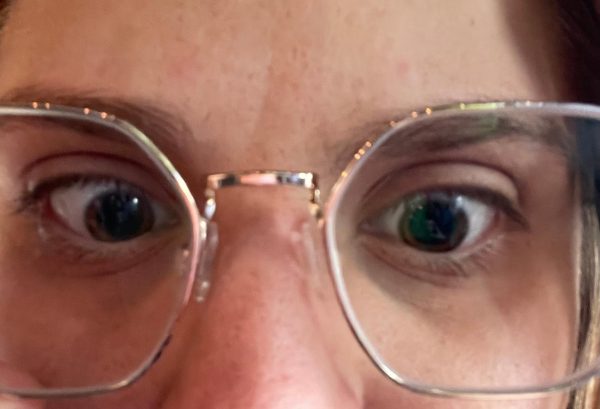
This occurrence completely derailed my day as I had work to do but wasn’t able to read the words on my phone and wasn’t supposed to be looking so closely at such a bright screen. But, since I needed to respond to my boss, I blindly bumbled down the street to a coffee shop, ordered a mediocre cappuccino because I couldn’t read the full menu and tried to fiddle with my phone.
To no one’s surprise, my eyes could not focus, so I couldn’t read my emails. I tried to make the text on my phone larger, but instead, I accidentally zoomed into a corner of my screen, rendering it useless.
At first, I was not panicked.
“I’ll just look up how to fix it!”
Well, I obviously couldn’t use my phone to do that. And, with a dead computer in what seemed to be the only coffee shop in the district without outlets, I was screwed.
“Oh, I’ll just call someone and tell them to look it up for me!”
Wrong. I couldn’t use my phone.
“Well then, let me look at the map and see if there are any other cafes nearby!”
Nope. I couldn’t really do that either, since my phone is the only map I have. Also, walking around the streets of D.C. partially blind with no sense of direction did not seem safe to me.
“Ugh, then I should just go home!”
Actually, I could not do that either! I couldn’t access my metro card to take the train because it was on my phone.
That’s when the panic set in.
I was left with only one option: going back to Union Station and scouring the place for an outlet to charge my laptop so that I could figure out how to fix my weird situation. After searching every level of Union Station for what felt like a century, I finally found an outlet in a hole in the tile floor. I charged my laptop and fixed the problem in less than a minute flat.
Throughout this entire ordeal, not only did I feel dumb for not knowing what I did to my phone and insanely ridiculous for how I looked with the little sunblockers under my regular glasses, I also felt stupid for not knowing how to do anything without using my phone.
As a comfort after that terribly embarrassing public endeavor, I treated myself to some Cane’s chicken tenders and a large sweet tea, which soothed my damaged ego. However, I still left Union Station feeling uncomfortable about the vulnerability I felt without my phone.
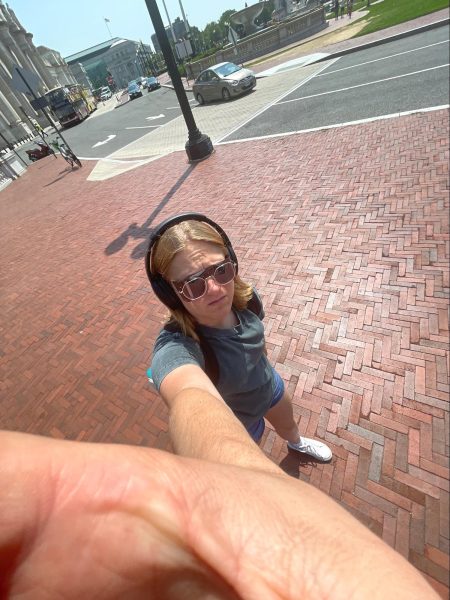
After reflecting on this feeling a few weeks ago, I tried to go for a day without using my phone. Unfortunately, I was practically forced to give up immediately because my alarm, which is on my phone, went off. To be clear, I would have no problem buying a traditional alarm clock, but I am a college student being paid minimum wage, so…
And even if I were to have followed through with this, I think that if I had not responded to my friends’ text messages all day, they would have thought that I was dead.
Realistically, due to the great versatility of smartphones, I fear that we have reached a point of no return: a point where every tool we need is consolidated onto one device. The ease of having your map, wallet, alarm clock, phone, camera, notepad, calculator and calendar all in one compact device is so incredibly convenient. But there’s another side to this: with all the technology that has become so commonplace in our lives, I think we have started to take it for granted.
That’s not to say people are losing the ability to use the original physical forms of the tools that we have on our phones. Perhaps some couldn’t, but I feel that if I really wanted to, I could buy a traditional crank-style alarm clock, use a paper map, and wear an analog watch. Not to generalize, but since these types of items are made to be used by the everyday person, I don’t think that any learning curve would be a problem. I just think that maybe the consolidation of so many essential tools in one place can be a problem at times, especially as companies have started to move from physical products to virtual ones (here, I’m thinking of the move to solely digital MetroCards. There are many people in DC without smartphones for whom this would cause problems).
Now, just to set the record straight, I am not a modern-day Luddite. I AM NOT AGAINST TECHNOLOGY!! I am a child of my generation. I love playing Minecraft on my Nintendo Switch and making silly little playlists and FaceTiming my friends and spam-posting on my “close friends” story and taking notes on my iPad. This piece is not a critique of the use of technology in that regard. And this isn’t EVEN about the massive rabbit hole that is social media and ever-shortening attention spans. This is just about essential items for daily life in a developed society.
I very well could be soapboxing right now and pulling the whole realization shtick of “guy-who-discovers-empathy-after-doing-psychedelics.” However, I do think that this societal shift away from the physical is concerning because, without our phones, we could become nothing. I’ve heard the argument that this is the natural progression of society, especially as we enter the era of artificial intelligence. But, God forbid my phone stops working or suddenly explodes because I would not be able to get into a classroom or even my own dorm room.
I don’t know. Maybe we should all start carrying paper maps and pocket watches? Maybe we should all start doing cave drawings and using foot-powered cars and whacking each other with comically sized wooden clubs?
I kid. But in all honesty, as technology advances, maybe this dependence is something to consider moving forward? Maybe it isn’t such a terrible thing not to digitize everything we own?
Ooga Booga
(caveman for “Peace & Love”)
Fallon



